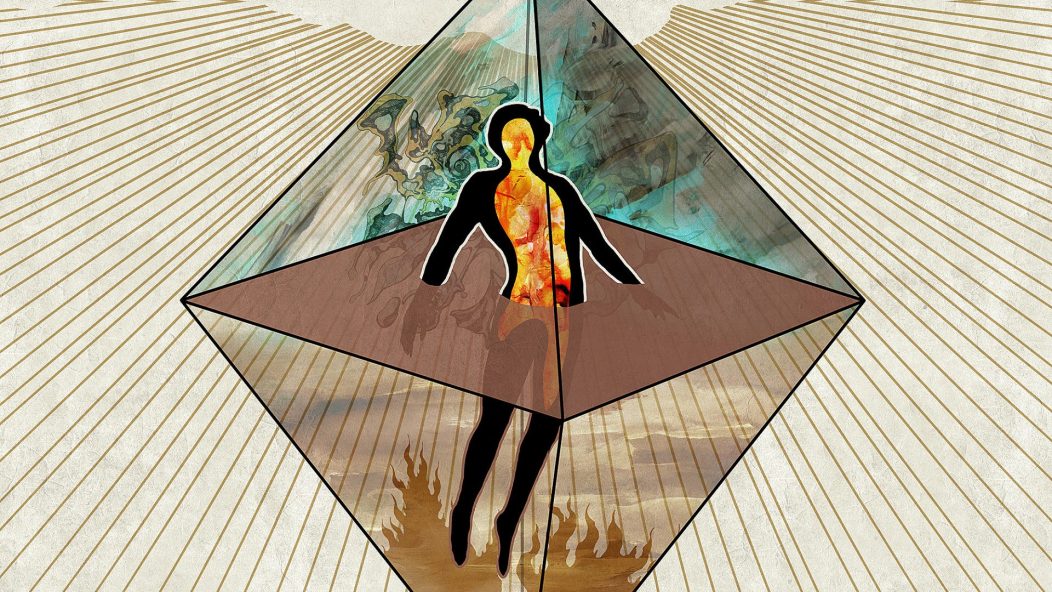
Nine Years of Progressive Transformation on Dordeduh's "Har"
Dordeduh‘s new album Har presages with the album art’s aesthetic precisely what you are to find inside. Previously, the band had been a progressive black metal band, blending Eastern European folk elements with the same kind of prog-black approach, a motivation inherited from the main songwriters’ time as Negură Bunget. There the songs were long and crenelated black metal, featuring a combination of approaches to the genre from the cold and frostbitten to the folk-instrument led and melodic to the atmospheric. Much like early Enslaved, the material found on Dordeduh’s self-titled debut album Zîrnindu-să was often longform if only because that was the scope it took to fit in all the varying ideas and narrative turns they clearly had in mind; the music was often less riff-based and more driven by the needs of the lyrics and development of ideas, playing out like miniature operas or pieces of extreme folk set to librettos. Har upends this, however, by being simply and purely a progressive metal album.
There is still black metal present, certainly, but where before Dordeduh’s lineage was apparent in each and every song, here the black metal occurs only sparingly across a slim minority of the album’s tracks. In its place is a groove-driven and wide-screen cinematic approach to progressive metal. This shift in approach admittedly is one we could have seen coming; Dordeduh itself was born from a creative split within Negură Bunget, with Dordeduh seizing up the more progressive musical ideas while Negura itself continued on in an increasingly black metal direction. That Dordeduh would then one day emerge from the chrysalis of black metal into the wider expanses of progressive metal like so many of their esteemed forebears is then perfectly understandable, especially given the particular post-Enslaved lineage of black metal they had worked within previously. So it becomes even more pleasing that the list of clear touchpoints for the group when approaching more distinctly prog material strays outside of the expected black metal-to-prog pipeline that’s been so well established.
…
…
Dordeduh’s incorporation of the more filmic and emotionally-driven contemporary prog approaches to their sound has likewise resulted in songs that are much tighter. The runtimes are, obviously, still quite long; this is prog after all, but no longer do we have long sections that seem to meander or repeat just a bit too long, held aloft only by the shifting notes of the tin flute. Instead, Dordeduh’s sense of musical development and rhythmic pulse feel deliberately more compact, making the transitions much easier to parse even on only one or two playthroughs despite their length and intensity. This seems to be tied back to the aesthetic shift as depicted by the album art, a body trapped within geometry seemingly split open by a beam of light (“enlightened”, get it?). This is a far cry from the crusted and worn wax-sealed wood of their debut or the crooked folk-isms of early Negură Bunget covers, most of which tended to evoke the sense of being lost in dense mythic woods steeped in ancient history. Here, the mood and imageset is pointed inward, purely psychological rather than the psychogeography common in many folk black metal bands. One gets the sense that for Dordeduh, it is much the same; Har is a document of them understanding at last the internality of their heritage rather than just its markers, the why and not just the what.
The results are an album soaring and engrossing, sliding effortlessly between the poignant self-actualizing eruptive geysers and the more elliptic traipses through wood and water. There is no firm and fixed geography for these songs, no easy imagistic grab like icy howling wind guitars or vast stormy oceanic rhythms like in other subgenres of metal. Instead, their shifting prog metal approaches seem to follow more the psychological contortions of an inward journey, ambiguous and self-fulfilling. Har is an album of brightness instead of coldness or earthiness, one unashamed of the heart-capturing attempts more comfortably found in modern prog than black metal. It is likewise a sound where the nine years between this and the debut are strikingly felt. Har emphatically does not feel like the followup to their self-titled debut; it feels often that there are years of history missing, EPs and full albums of slow development that have somehow been deleted from time. For reference, Ihsahn and Enslaved’s marches toward similar musical space was well-documented, the experiments and congealings that led to their current approach easily traced back to their striking black metal roots. Here, there is a noticeable gap, Har being a radical leap into sounds that before were only germinal in their work.
Thankfully, and most importantly, it is a leap that works. Har may not be the record that longtime fans of the group wanted to receive; it is easy to imagine longtime fans of their approach to black metal being deeply turned off by this new offering, but to the ever-burgeoning world of progressive and just plain inventive and emotionally satisfying contemporary heavy metal, Har should prove a satisfying and riveting record for the year. One hopes this is the record that puts their name on the lips of many, many more. I wouldn’t be especially surprised if this becomes the predominant direction of the group in years to come; there is a sudden and fierce vitality on Har that feels as explosive as it is still untapped, with many more emotional shades and images left to be discovered within it by the group. This is precisely the kind of wild evolution of a group one hopes to see.
…










